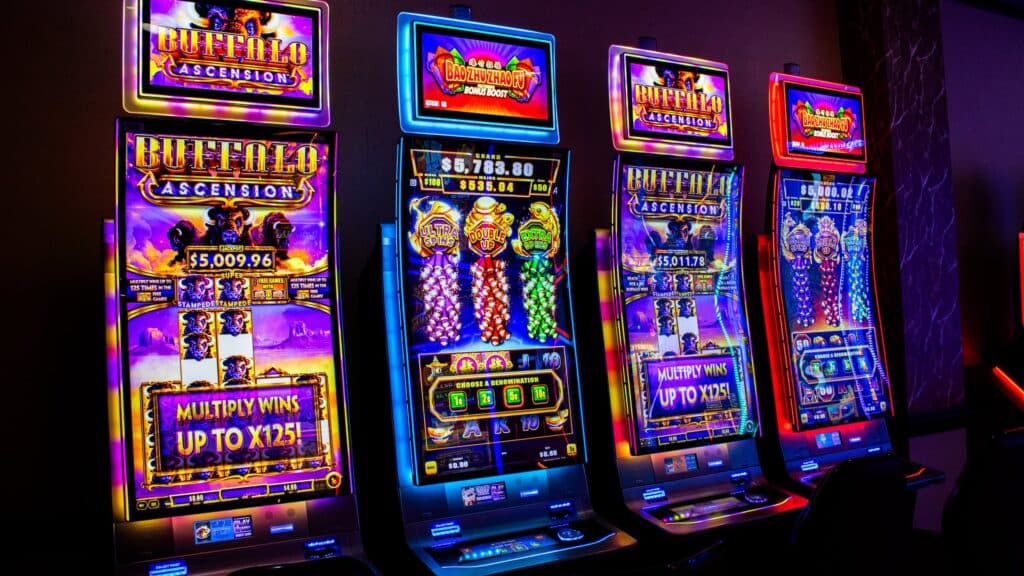The history of slot machines is a captivating journey through innovation, chance, and the enduring allure of instant fortune, tracing back to the late 19th century and evolving into the sophisticated digital games we know today.
The Dawn of Mechanical Marvels: From the Liberty Bell to Early Innovations
The story of slot machines begins in the late 1800s, a period of rapid industrial advancement and burgeoning entertainment culture. While various gambling devices existed prior, the invention widely recognized as the precursor to the modern slot machine is attributed to Sittman and Pitt, who in 1891, developed a five-reel mechanical machine featuring playing card symbols. This "Poker Machine," found in bars across New York, required players to insert a nickel and pull a lever, hoping for a winning poker hand. There was no direct payout mechanism; instead, winning combinations often rewarded players with drinks or cigars from the bar, making it a novel form of amusement rather than a direct cash gambling device.
However, the true ancestor of contemporary slot machines emerged from the ingenuity of Charles Fey, a German-born mechanic in San Francisco. In 1894, Fey created the "Liberty Bell," a simpler, more reliable machine that revolutionized gambling. Unlike its predecessors, the Liberty Bell featured only three spinning reels adorned with five symbols: diamonds, hearts, spades, horseshoes, and the Liberty Bell itself, from which the machine derived its iconic name. This reduction in complexity not only enhanced reliability but also paved the way for automated payouts. By aligning three Liberty Bell symbols, players could win the top prize, marking a significant leap forward in slot machine design. The Liberty Bell's innovative mechanism and direct cash payout system quickly captured public imagination and set the standard for future slot machines.
Despite its groundbreaking success, Charles Fey never patented his invention. This decision, while perhaps limiting his personal financial gain, inadvertently fostered widespread imitation and accelerated the evolution of the slot machine. By 1905, just over a decade after the Liberty Bell, a "Fey Liberty Bell" machine mysteriously appeared in the Mills Novelty Company plant in Chicago, signaling the growing popularity and commercial viability of Fey's design [1]. Manufacturers like Mills Novelty Company capitalized on Fey's unpatented design, producing their own versions and further popularizing slot machines across America and beyond. These early mechanical marvels, characterized by their cast iron casings, spinning reels, and limited symbol sets, laid the foundation for the multi-billion dollar slot machine industry we see today.
Electromechanical Era: The Rise of "Money Honey" and New Features
The mid-20th century witnessed a pivotal shift in slot machine technology with the advent of electromechanical machines. While purely mechanical slots relied entirely on springs, gears, and levers, electromechanical slots integrated electrical components to power the reels and automate payouts. This transition, while seemingly incremental, unlocked new possibilities in game design and player experience. A key innovation during this era was the introduction of bottomless hoppers, enabling machines to handle larger payouts automatically, eliminating the need for manual coin dispensing for smaller wins.
In 1964, Bally Technologies, a prominent name in gaming history, unveiled "Money Honey," the first fully electromechanical slot machine. Money Honey retained the familiar levers and spinning reels but utilized electric motors and solenoids to drive the reels and manage payouts of up to 500 coins automatically. This electromechanical innovation not only increased the efficiency and reliability of slot machines but also paved the way for more complex game features and higher payout potential. The glowing cabinet and vibrant sounds of Money Honey were designed to attract attention on casino floors, signaling a move towards more engaging and visually appealing gaming experiences.
The electromechanical era also saw the diversification of symbols and themes on slot machine reels. While early machines predominantly featured card suits and bells, manufacturers began incorporating fruit symbols – cherries, lemons, plums – alongside bars and lucky sevens. This shift towards fruit symbols, driven partly by legal restrictions and efforts to circumvent gambling regulations, became an enduring visual element in slot machine design. These "fruit machines," particularly popular in the UK, added a layer of playful imagery to the gambling experience, softening the perception of slot machines and broadening their appeal beyond traditional gambling circles. The electromechanical advancements of this period set the stage for the next major transformation: the digital revolution and the rise of video slots.
Video Slots Revolution: Digital Displays and Enhanced Gameplay
The late 20th century ushered in the digital age, and with it, a seismic shift in slot machine technology: the birth of video slots. In 1976, Fortune Coin Co., later acquired by International Game Technology (IGT), developed the first video slot machine, initially installed at the Las Vegas Hilton hotel. This groundbreaking machine replaced the physical reels with a video screen displaying simulated reels, powered by a logic board. While the initial reception was lukewarm – gamblers were accustomed to the tactile experience of physical reels – video slots quickly gained traction as technology improved and game designers explored the vast potential of digital displays.
The transition to video slots was revolutionary for several reasons. Firstly, it liberated game design from the constraints of mechanical reels. Video screens could display more reels, more paylines, and more intricate graphics and animations, leading to richer and more engaging gameplay. Secondly, video slots facilitated the introduction of entirely new game features, such as bonus rounds, multipliers, and progressive jackpots, which were difficult or impossible to implement in mechanical slots. Bonus rounds, triggered by specific symbol combinations, transported players to separate screens for mini-games offering additional chances to win, adding layers of interactivity and excitement. Progressive jackpots, pooling a fraction of each wager across a network of machines, created the potential for enormous payouts, fueling the dream of life-changing wins. The graphical capabilities of video slots also allowed for themed games, drawing inspiration from popular culture, movies, and television shows, further enhancing player engagement and broadening the demographic appeal of slot machines.
IGT's Wheel of Fortune, launched in 1996, became a quintessential example of the video slot phenomenon. Based on the immensely popular TV game show, Wheel of Fortune slots incorporated sound clips, video animations, and a bonus wheel that players could spin for multiplied winnings. Its widespread popularity cemented the dominance of video slots on casino floors and demonstrated the power of branding and multimedia integration in game design. Video slots not only transformed the gambling landscape but also significantly increased casino revenue. The enhanced game features, higher payout potential, and immersive experiences of video slots attracted a broader audience and encouraged longer play sessions, solidifying their position as the dominant form of slot machine in modern casinos.
The Digital Age: Online Slots and Mobile Gaming
The late 20th century's technological advancements extended beyond video displays, paving the way for the next major evolution in slot machines: the rise of online and mobile gaming. The advent of the internet and personal computers in the 1990s created a new frontier for the gambling industry, and online casinos began to emerge, offering virtual versions of classic casino games, including slots. Microgaming is often credited with launching the first true online casino in 1994, quickly followed by numerous others as internet access became more widespread.
Online slots mirrored their land-based video slot counterparts in many ways, featuring digital reels, themed graphics, bonus rounds, and progressive jackpots. However, the online format offered several distinct advantages. Firstly, accessibility was dramatically increased. Players could now access slots from the comfort of their homes, eliminating geographical barriers and time constraints. Secondly, online casinos could offer a far wider variety of games than traditional casinos, as virtual space was virtually unlimited. This led to an explosion of game themes, payline configurations, and innovative features, catering to diverse player preferences. Thirdly, online casinos often offered more generous payout percentages and bonuses compared to land-based casinos due to lower overhead costs, further attracting players to the online realm.
The rise of mobile technology in the 21st century further revolutionized the slot machine industry. Smartphones and tablets became ubiquitous, and online casinos adapted quickly, developing mobile-compatible platforms and dedicated casino apps. Mobile slots allowed players to gamble on the go, anytime and anywhere, blurring the lines between traditional casino gambling and on-demand entertainment. The convenience and accessibility of mobile slots fueled explosive growth in the online gambling market, attracting a new generation of players who valued flexibility and mobile-first experiences. Today, online slots and mobile slots constitute a massive global industry, with countless game providers, online casinos, and a continuous stream of new games and technological innovations. From virtual reality (VR) slots to skill-based bonus rounds, the digital evolution of slot machines continues to push the boundaries of gaming entertainment.
Modern Slot Machines: Trends, Features, and Responsible Gambling
Modern slot machines, both online and land-based, are a far cry from Charles Fey's Liberty Bell. They are sophisticated technological marvels, incorporating advanced computer software, high-resolution graphics, immersive soundscapes, and a vast array of interactive features. One prominent trend in modern slots is the increasing emphasis on player engagement and entertainment value, moving beyond simple reel spinning. Gamification elements, such as loyalty programs, leaderboards, and social features, are becoming more common, fostering a sense of community and competition among players.
Modern slots boast an incredible diversity of themes and styles, catering to virtually every interest and demographic. From ancient Egypt and mythology to space exploration and pop culture icons, the thematic possibilities are endless. Game mechanics have also become increasingly complex, with features like cascading reels, expanding wilds, megaways paylines (offering hundreds of thousands of ways to win), and interactive bonus games that resemble video game mini-quests. Progressive jackpots continue to be a major draw, with some online progressive jackpots reaching tens of millions of dollars, creating headline-grabbing winners and fueling the allure of instant riches.
However, the evolution of slot machines and their widespread accessibility also raise important considerations regarding responsible gambling. The ease of access, speed of play, and engaging features of modern slots can contribute to problem gambling for vulnerable individuals. Responsible gambling initiatives are increasingly important in mitigating potential harm. Online casinos and gambling regulators are implementing measures such as deposit limits, self-exclusion programs, reality check reminders, and responsible gambling resources to promote safe and responsible play. For players, understanding the risks associated with slot machines, setting limits on time and spending, and seeking help if gambling becomes problematic are crucial steps towards enjoying slots as a form of entertainment without experiencing negative consequences. The future of slot machines will likely see continued technological innovation and further integration of digital and mobile platforms. As the industry evolves, a focus on responsible gambling and player protection will be paramount to ensure a sustainable and ethical gaming environment.
Conclusion: A Continuing Evolution
From the clanging bells of mechanical marvels to the dazzling displays of digital entertainment, the slot machine's journey reflects a fascinating interplay of technological innovation, popular culture, and human fascination with chance. Originating as simple mechanical devices in saloons and bars, slot machines have transformed into sophisticated, multifaceted games that dominate the gambling industry and permeate digital entertainment. Their evolution is not merely a technological one; it's a cultural phenomenon, mirroring societal shifts in entertainment preferences, accessibility, and the evolving relationship between technology and leisure. As slot machines continue to adapt to new technologies and player expectations, their fundamental appeal – the promise of instant fortune and the thrill of the spin – endures, ensuring their place in the ever-changing landscape of gaming and entertainment. For gamblers, understanding this rich history provides a deeper appreciation for the games they play, while also highlighting the importance of responsible engagement in this dynamic and ever-evolving world of chance.
External Resources:



